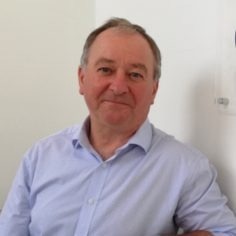
Do you have any sustainability goals? Where would you place your firm on the digitization journey? Is process analytical technology being implemented, or is it still in the vision stage?
Sustainability is sometimes divided into three categories: economic, environmental, and social. It is described as the ability to maintain or support a process throughout time.
Other definitions include the ability to meet the requirements of the current generation without jeopardizing the demands of future generations all while maintaining a balance of economic growth, environmental stewardship, and social welfare.
But what does this mean for your organization, and how can it be successfully implemented? For example, does digitization promote sustainability or have an environmental impact on its own?
Join this webinar featuring the following industry experts:
- Mark Henson, Head of Sustainable CMC at Takeda
- Mark Milton, Associate Fellow at Takeda
- Andrew Phillips, Head of Digitalization, Pharmaceutical Sciences at AstraZeneca
- Martin Gadsby, Co-founder of Optimal Industrial Technologies and PAT expert
- Anna Codina, Director of the Pharmaceutical Business Unit at Bruker BioSpin
These experts will address the relationship between digitalization, sustainability, and process analytical technologies, as well as provide practical examples of their application in the pharmaceutical and biopharma industries.
Helium production and supply sustainability will also be examined in terms of nuclear magnetic resonance (NMR), with solutions for helium recycling and the most recent results from a cryogen-free tabletop spectrometer utilized as a smart detector for flow chemistry.
Continuous-flow chemistry, which is small and extremely efficient by design, has significant benefits when integrated with green chemistry principles and process analytical technologies to promote the development of more sustainable chemistry and bioproduction.
Key learning objectives
- Key challenges in digital transformation
- Gain insights on sustainability chemistry goals in the pharmaceutical industry
- Modern technologies that enable greener chemistry
- Sustainability through the next generation of drugs
- Economic significance and current challenges in the pharmaceutical industry
- Digitalization and its impact from drug discovery to development
- Insights into machine learning and artificial intelligence applications to Process Analytical Technology (PAT)
Who should attend
- Pharmaceutical & Fine Chemists
- Academic Chemistry Researchers
- Process & Development Chemists
- Drug Discovery and Development
- Manufacturing in Pharmaceutical industry
- Sustainability Directors
About the speakers
Mark Henson, Head of Sustainability, Takeda

Mark Henson is a Senior Scientific Fellow and Head of Sustainable CMC at Takeda Pharmaceutical Sciences Research & Development. He has 21 years of R&D and commercial technical operations expertise, creating and implementing novel PAT, data modeling, and advanced processing capabilities for medicines, embryology, and chemicals.
Henson now oversees a strategy, cross-functional Sustainability & Innovation initiative for Takeda Pharm Sci R&D and heads an associated Sustainability Board made up of thought leaders from across the organization.
He has also obtained a Ph.D. in Bio-Inorganic Chemistry from Stanford University in California, US.
Andy Phillips, Head of Digitization, AstraZeneca
 Dr Andy Phillips has been with AstraZeneca for 20 years, first as an NMR spectroscopist and later directing a variety of teams in Pharmaceutical Sciences, including analytical chemistry and product development.
Dr Andy Phillips has been with AstraZeneca for 20 years, first as an NMR spectroscopist and later directing a variety of teams in Pharmaceutical Sciences, including analytical chemistry and product development.
More recently, he has focused on digital transformation, managing both a project called 'Digital Lab', which has begun a path of investment across all AstraZeneca R&D labs, and as Head of Digitization within Pharmaceutical Sciences.
Martin Gadsby, Owner and Director, Optimal Industrial Automation
 Martin Gadsby graduated from the University of Bath in the late 1970s, and after working in several industries, he was appointed as Kraft Foods' European R&D Process and Process Automation Group Leader.
Martin Gadsby graduated from the University of Bath in the late 1970s, and after working in several industries, he was appointed as Kraft Foods' European R&D Process and Process Automation Group Leader.
After a few years at Kraft, Gadsby decided to start a process automation company with a colleague, Dave Richards, and Optimal was formed.
Optimal Industrial Automation was founded over 33 years ago, and Gadsby is now Vice President of Optimal Industrial Technologies, which was formed more recently as the products division and is the market leader in Process Analytical Technology (PAT) with its PAT Knowledge Management product, synTQ.
He is also actively involved in the advancement of synTQ and advises the Optimal development team on what he feels to be the best development path.
Over the last few years, he has taken over general responsibility not only for the company, but also for synTQ's sales and marketing, while being actively involved in assuring synTQ's continued development. Gadsby is also a self-proclaimed 'petrolhead' who enjoys flying aerobatics and racing vehicles.
Mark Milton, Associate Fellow, Takeda
 Mark Milton received his Ph.D. in 1997 from the University of St. Andrews in Scotland, where he studied the chemoenzymatic synthesis (and subsequent structural determination) of oligosaccharides with NMR. He went on to become a Postdoctoral Fellow at both the University of Alberta and the University of Pennsylvania.
Mark Milton received his Ph.D. in 1997 from the University of St. Andrews in Scotland, where he studied the chemoenzymatic synthesis (and subsequent structural determination) of oligosaccharides with NMR. He went on to become a Postdoctoral Fellow at both the University of Alberta and the University of Pennsylvania.
He subsequently moved into industry, taking a research post at Wyeth in Pearl River, New York, before joining Millennium Pharmaceuticals (later Takeda Pharmaceuticals) in 2004. He co-founded NewNMR (www.newnmr.org), a Boston-based NMR scientific discussion forum, alongside scientists from MIT and Amgen in 2011, and has served as its President ever since.
His present study focuses on the potential of tiny form factor and mobile NMR technologies to bring NMR power directly to the chemist's fume hood.
Anna Codina, Ph.D., Senior Director Strategy and Business Development, SciY
 Anna Codina has a degree in Chemistry and a Ph.D. in Protein NMR from the University of Barcelona, Spain.
Anna Codina has a degree in Chemistry and a Ph.D. in Protein NMR from the University of Barcelona, Spain.
She completed a post-doc in protein NMR at the MRC Laboratory of Molecular Biology in Cambridge, UK, and then worked for Pfizer's Analytical R&D department for seven years, where she gained expertise in low-level impurity structure elucidation, reaction monitoring, qNMR, and regulatory documentation.
She has also received the Pfizer Worldwide Achievement Award for using NMR-based reaction monitoring in an open-access environment.
In 2011, Codina joined Bruker and has held many roles since then, including Material Characterization Laboratory Manager, Product Portfolio Manager, and, for several years, driving the Biopharmaceutical business at Bruker BioSpin. She has more recently joined SciY as Senior Director of Strategy and Business Development.